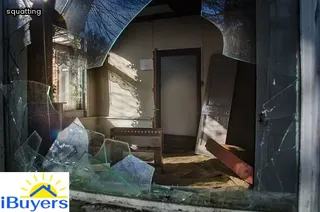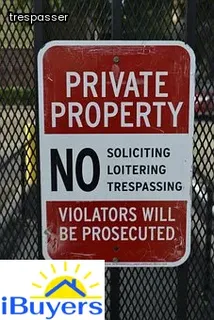Squatting is the act of occupying a property without the permission of the owner, and squatters have certain legal rights in Michigan. Squatters may be able to establish possession under certain conditions, such as when they occupy a property in good faith and pay taxes on it or continue to use it in the same manner that it was used by a previous occupant.
Michigan law also allows for adverse possession, which means that if a squatter has occupied the property for more than fifteen years and has paid all applicable taxes on the property, they may have legal ownership rights over it. In addition to adverse possession, squatters can also seek protection under landlord-tenant laws if an informal rental agreement was made with the previous owner.
Homeowners must understand these laws in order to protect their properties from potential squatters and ensure that any disputes are handled legally and fairly.

Recognizing squatters on your property can be tricky, as they may try to blend in or not draw attention to themselves. It is important to understand the signs of a squatter in order to protect yourself and your property.
Squatters are often identifiable by their lack of ownership rights, as they will typically not have any proof of residency or documents that demonstrate ownership rights. Additionally, squatters may cause damage to the property, such as broken windows and doors, graffiti, and other modifications without permission.
Additionally, it is common for squatters to change locks or create new ones without prior approval from the owner. Finally, squatters may also attempt to interfere with regular activities on the property such as collecting rent from tenants or entering buildings without permission.
Knowing these signs can help you identify potential squatters so that you can take action before it becomes a serious issue.
Navigating adverse possession laws in Michigan can be a daunting task. It's important for homeowners to know their rights when it comes to squatters, as the state of Michigan has a long history of recognizing squatter's rights.
The concept of adverse possession allows an individual who is not the true owner of a piece of property to gain legal title to it if certain conditions are met. In order for adverse possession to occur, the individual must occupy or use the land for an extended period of time without permission from the owner and with the intent to claim it as their own.
If all requirements are satisfied, they may be able to obtain title after a certain amount of time has passed. Homeowners should be aware that squatters may have more rights than they think, so it's important to familiarize yourself with the laws surrounding squatter's rights in your state before taking action against them.
By understanding these laws, homeowners can take steps to protect their property and ensure that they maintain rightful ownership over their land.

Defending yourself against squatters in Michigan can be a tricky situation, but it is important to know what your rights are as a homeowner. Under Michigan law, squatters may gain legal possession of an abandoned property if they have resided there for at least 15 years without interruption.
As such, it is essential to understand the laws surrounding squatter’s rights and how to protect yourself from someone illegally gaining possession of your property. To do this, you should be aware of the steps necessary to defend yourself against squatters in Michigan.
First and foremost, you must be vigilant in monitoring your property and any changes that could indicate someone has taken residence on your land. Additionally, you should seek out legal counsel if you suspect a squatter has moved onto your land; lawyers can help you understand the proper steps to take in order to legally remove them from the premises.
Furthermore, having a well-written lease or rental agreement may also provide added security by specifying that a tenant will not hold over their tenancy beyond the agreed upon date. Finally, it is important that homeowners stay abreast of state laws regarding squatting as these can vary widely from one region to another and could ultimately determine whether or not your case will be successful.
Protecting yourself from squatters can be a daunting experience, especially in Michigan where the legal landscape is often unclear. It's important to take preventative steps to protect your property and ensure that you are not taken advantage of by individuals who may claim squatter's rights.
First, be aware of local ordinances, as some municipalities have special laws or regulations on squatting that could impact your rights as a homeowner. Next, make sure you have clear and visible signage stating that the property is private and cannot be accessed without permission.
You should also keep an eye out for any suspicious activity or behavior around your home, and document any evidence that you observe that could help establish proof of ownership in the case of a dispute. Finally, review all leases or rental agreements carefully to ensure that they include strong eviction clauses in order to protect yourself against any potential issues with squatters.
Taking these steps can help you protect your home from unwanted occupants and give you peace of mind when it comes to dealing with squatter's rights in Michigan.

When trying to find affordable home and car insurance in Michigan, homeowners should consider all their options. Many companies offer competitive rates, but it’s important to compare multiple insurance plans to ensure you’re getting the best deal.
It may be beneficial to look for companies that specialize in home and car insurance in Michigan as they will likely be more familiar with the laws surrounding squatter’s rights. Some of these companies may even offer a discount if both your home and auto insurance policies are with them.
Additionally, researching additional coverage options could save you money and provide extra protection in certain situations. Consider exploring different levels of coverage or asking about any discounts that may apply to you based on your lifestyle or occupation.
With so many variables to consider when purchasing home and car insurance, it’s important for homeowners in Michigan to explore their options thoroughly before committing to a policy.
When it comes to protecting solar panels from hail damage, there are several strategies that homeowners in Michigan should be aware of. Knowing the local laws on squatter's rights can help protect your property from unauthorized use of your solar panels.
Installing a hail-proof shield or covering for your solar system is one of the most effective ways to prevent damage from storms. A hail-resistant covering or shield acts like a protective layer against hail and other debris, reducing the risk of serious damage.
Additionally, keeping up with regular maintenance such as cleaning and inspecting your panels regularly will also help minimize any potential risks associated with hail damage. Finally, be sure to check with your insurance provider to see if they offer coverage specifically for hail damage to solar panels so that you are financially protected in case of an unexpected storm.

When it comes to deciding between a townhouse and a house, there are pros and cons that should be considered. Townhouses are typically more affordable than houses; however, they also tend to offer fewer square feet of space.
Houses, on the other hand, provide more square footage and often come with an outdoor area such as a garden or yard. Furthermore, townhouses typically provide shared walls with neighbors which can lead to noise issues if the other units in the complex are not well-maintained.
Additionally, homeowners in townhouses may not be able to make certain modifications or improvements without permission from their local homeowners association. Houses generally offer more privacy, but they also require greater upkeep and maintenance costs due to having larger yards that need to be regularly taken care of.
Overall, when weighing the pros and cons of townhouses versus houses, potential buyers should consider their budget as well as lifestyle needs before making a decision.
In Salt Lake County, UT, property taxes are an important factor for homeowners to consider when exploring their rights. Property taxes can vary significantly from one municipality to the next, and understanding the unique tax structure in your area is key to ensuring that you can maximize your squatter's rights in Michigan.
Property taxes are calculated based on a variety of factors such as the value of the home, its location, and other factors which can all affect how much you owe. In addition to these assessments, local governments may also levy extra taxes on certain types of properties or impose additional fees depending on where they are located.
It is important to familiarize yourself with the specific policies and laws in your locality before attempting to utilize any squatter's rights in Michigan so that you can be sure that your investment is protected and you are not paying more than necessary.

Syndication is a common practice in Michigan, with many homeowners taking advantage of its profit potential. However, it's important to understand the potential risks associated with syndication before entering into an agreement.
This is especially true when it comes to squatter's rights, as these can be at odds with the agreement between the homeowner and their syndicate partner. It is essential that homeowners understand the applicable legal framework of squatter's rights before signing any agreements related to syndication.
This includes researching local laws concerning squatters, as well as any other relevant statutes or regulations that may affect the situation. Additionally, due diligence should be taken during negotiations to ensure that all parties are fully informed about their respective rights and responsibilities under the agreement.
Finally, a qualified attorney should always be consulted if there are any questions regarding squatter's rights or other potential legal issues relating to syndication in Michigan.
The Recently Viewed Content Feature is an important tool for home owners in Michigan to be aware of when it comes to understanding the recently unveiled Squatter's Rights. The feature, which allows home owners to easily understand the boundaries of the rights, can help them make sure they are not in violation of any laws or regulations that have been put into place.
By analyzing this feature, homeowners can be sure they know what their rights are and how far those rights extend. Additionally, understanding the Recently Viewed Content Feature will help them stay informed about potential changes in law that might affect their property or squatters on their land.
Knowing what is allowed and what isn't can save a homeowner from unnecessary financial and legal troubles down the road.

When it comes to understanding the rights of squatters in Michigan, homeowners need to know their legal options. Homeowners should be aware that a squatter may take up residence on their property without the owner’s permission or knowledge and can become difficult to remove.
Homeowners must be familiar with their rights when it comes to squatters in order to avoid being taken advantage of. Knowing how to recognize a squatter and understanding what steps must be taken are important components in utilizing main content strategically.
Additionally, homeowners should research local laws and regulations surrounding removing a squatter from their property as well as any penalties for failure to do so correctly. Understanding the potential risks and liabilities of ignoring or mishandling the situation is essential in making an informed decision about what actions should be taken.
Ultimately, taking the time to research squatters' rights in Michigan can help homeowners protect their property from unwanted occupants.
Squatter's rights, which are also known as adverse possession, have been a part of the law in Michigan for many years. But recently, there has been a push from both homeowners and lawmakers to better understand how these legal concepts can affect property owners.
In this article, we will examine the impact of squatter's rights on homeowners in Michigan. We will explore the history of these laws, discuss the various points of view held by homeowners and lawmakers, and explain what steps homeowners can take to protect themselves from potential squatters.
We will look at cases where squatters have successfully taken possession of properties without permission from the owner and review court rulings that have established some key parameters around when squatters may be able to gain ownership. Finally, we will provide an overview of current legislation in Michigan related to squatter’s rights and review options available to homeowners who find themselves dealing with a squatter situation.

When faced with a squatter on their property, Michigan homeowners must take certain steps to process the situation legally. First, they should become familiar with the state’s laws on squatting and tenants’ rights, as well as any local ordinances that may apply.
Homeowners should then seek legal advice from an experienced attorney to ensure all available rights are protected. It is important to have a clear understanding of who has legal authority over the property in question and what options are available for removing or evicting the squatter.
This may include filing an unlawful detainer action, obtaining a court order for ejectment, or even seeking criminal charges if applicable. In addition, homeowners need to be aware that squatters may also have certain rights under state law such as claiming possession after a period of time.
Knowing these potential legal implications can help prepare homeowners for whatever outcome emerges from their particular situation.
In Michigan, it is important for homeowners to understand the difference between tenants and squatters. Tenants are individuals who have a written lease agreement with the owner of the property that outlines the terms of their stay, such as payment of rent and other conditions.
Squatters, on the other hand, occupy a property without the consent of the owner or any legal agreement. Squatting is unlawful in Michigan; however, there are certain laws that provide protection for squatters who meet certain criteria.
These protections include occupancy rights and eviction rights that may be more limited than those granted to a tenant. To determine if someone qualifies as a squatter in Michigan, courts look at factors such as whether they pay rent or utilities; how long they have occupied the property; whether they maintain exclusive control over it; and if they took steps to improve it.
Homeowners should be aware of these distinctions when dealing with potential tenants or squatters in order to protect their interests.

When it comes to understanding landlord rights regarding squatters in Michigan, there are several important things to consider. First, owners of residential property have the right to protect their property from unwanted intrusions, including squatters.
Additionally, if a squatter is living on someone's land without permission or a lease agreement, the landlord has the right to evict them with proper notice and due process. Furthermore, local laws can provide additional protections for landlords by requiring a certain amount of time before a squatter can establish legal residence on someone's property.
Finally, landlords should be aware that squatting is viewed as trespassing and may be subject to civil or criminal penalties depending on the circumstances. It is important for homeowners in Michigan to understand their rights and obligations when it comes to dealing with squatters so that they can ensure their land is protected from any potential issues.
In Michigan, it is important for homeowners to be aware of their rights when dealing with squatters. Knowing what resources are available can help to make the process smoother and ensure that all parties involved are treated fairly.
The Michigan State Housing Development Authority (MSHDA) provides a range of helpful resources for those facing issues with squatters in the state. The MSHDA website offers information on tenant-landlord relations, including leases, tenant rights and responsibilities, and how to deal with illegal occupants.
In addition, the MSHDA also provides information on safety measures that can be taken to protect property from squatting. Homeowners can also contact their local police department or county court to learn more about their specific rights as they relate to squatting in Michigan.
Finally, homeowners can also seek legal advice from an attorney who specializes in landlord-tenant law or eviction proceedings if needed. By researching these resources and understanding their rights, homeowners in Michigan can be better prepared when it comes to dealing with any issue related to squatters on their property.

In Michigan, squatting has become a growing issue that needs to be addressed. Examining relevant case studies around squatting can help us better understand the ethical dilemmas surrounding the practice in Michigan.
By looking at the past, we can gain insight on how to prevent similar situations from occurring in the future and investigate effective solutions. Squatting is a complex problem, so it is essential to consider all of the factors involved including legal rights and responsibilities of both homeowners and squatters.
By examining these case studies, we may be able to find solutions that are beneficial for both parties and create a better understanding of what can be done to address this issue in Michigan.
In Michigan, squatters rights are a form of adverse possession that allow a person to gain legal ownership of a property they have been occupying without the consent of the true owner. Squatters must meet certain requirements in order to acquire legal title to the property.
These requirements include living on the land for at least 15 years, paying taxes on the property, and making improvements or repairs to the property during that time period. In addition, during this 15-year period, squatters must use the land in an open and notorious manner as though they were its rightful owners.
If all these criteria are met, then squatter's rights may be granted by a court of law in Michigan. Homeowners should be aware of their rights regarding squatters and make sure that their properties are not being unlawfully occupied.

Yes, Michigan does have squatters’ rights, and it is important for homeowners to understand how the law works. Squatter’s rights in Michigan are defined as “adverse possession,” which gives squatters a legal right to land that they occupy and use for a certain period of time.
This period of time is determined by state law. In Michigan, this period of time is 15 years if the squatter pays taxes on the property or 7 years if they do not pay taxes.
It is important for homeowners to be aware of this law so they can take appropriate steps to protect their property from an unexpected claim from a squatter. Homeowners should also be aware of any existing laws surrounding eviction procedures for squatters so they can ensure the process is handled legally and fairly.
Squatters in Michigan can acquire rights to a property after residing there for 15 years uninterrupted. A squatter is defined as an individual who resides on another person’s land without permission and without paying rent.
In Michigan, the shortest time frame it takes for a squatter to obtain legal rights to a property is 15 years. This timeframe refers to the amount of continuous, uninterrupted possession of the property by the squatter.
According to state law, if a person has occupied someone else's property for more than 15 consecutive years, they may be able to claim ownership of that land through what is referred to as “squatters rights." Although this process may seem simple, homeowners should be aware that there are several steps involved in claiming squatters rights and that the process can take time and resources before it is complete.
Homeowners should also be aware that if squatters have lived on their property for longer than 15 years, they are legally allowed to remain there until evicted by court order. Therefore, it is important for homeowners in Michigan to understand their options when it comes to dealing with squatters on their land.
Adverse possession laws in Michigan are state statutes that allow a person to gain legal title to real property through occupation and use. Squatter's rights, as they are commonly referred to, involve the acquisition of ownership of a property by occupying it for a period of time defined by state law.
In Michigan, adverse possession requires that the claimant be in actual, open, notorious, exclusive and hostile possession of the property for 15 years or more. The adverse possessor must also pay all taxes due on the property during this time period and make improvements in good faith.
Furthermore, prior to filing an adverse possession claim in Michigan, the squatter must provide written notice of their intent to claim ownership of the property to the true owner. If these conditions are met and proven in court, then title will be granted to the person who has occupied and made use of the land for at least 15 years.
A: In Michigan, the landowner must provide the squatter with at least 28 days written NOTICE TO VACATE, and inform them that they are not entitled to receive any back rent or tax payment.
A: Yes, the act of squatting on another person's property is considered criminal trespassing and is against the law in Michigan. If the sheriff discovers someone living on someone else’s property without permission, it is considered a crime and may result in criminal charges.

A: No, Tenants at Will are not granted any squatters rights in Michigan rental properties owned by landowners.
A: The court system typically deals with squatters rights in Michigan through civil action, rather than criminal proceedings. However, depending on the circumstances of an individual case, it may be possible for charges such as trespassing or burglary to be brought against a squatter. In more severe cases, such as those involving property management or a judge's property, a felony charge may also be pursued.
A: No, self-help is not allowed for eviction in Michigan. The property owner must file a lawsuit in court and obtain an order of eviction from the judge before the squatters can be removed. Failure to comply with this process can result in a suit or imprisonment.
A: A Michigan resident can file a complaint with their local police department or county sheriff's office to initiate an investigation into possible squatting and removal of the individuals from the property.